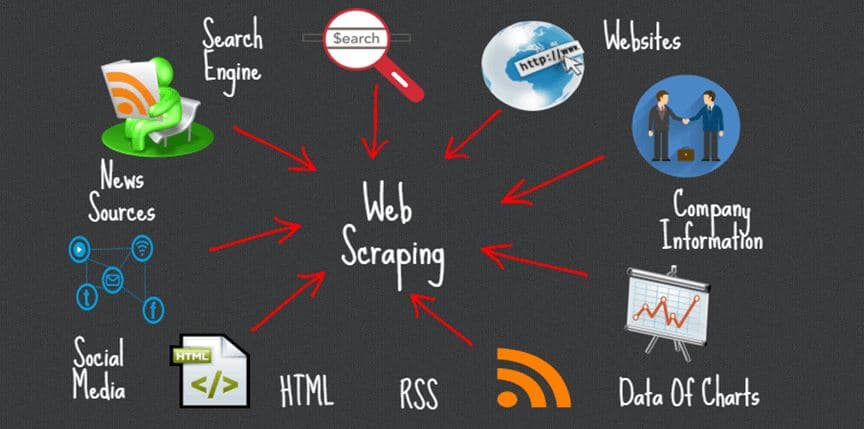Web scraping is an automated process of collecting information available on the Internet, that meets specified requirements. You can parse data from websites, search engine results pages, social networks, etc.
Some sites could be scraped using simple desktop crawlers, some require using SAAS solutions or your own parsing scripts. More and more companies take efforts to protect their data, and in most cases, you will have to deal with Cloudflare’s Captcha.
Who needs web scraping and why
Web scrapers save time and money by collecting large amounts of data and storing it in an easy-to-use format. This data is then used by digital marketers, SEO specialists, and sales staff.
Web scrapers help with the following tasks:
- Monitoring prices for certain products on your competitors’ websites. This is particularly useful for businesses operating in the e-commerce industry. With the help of the web scrapers, you can monitor the prices of competitors and automatically fill the catalog on your resource.
- Parsing websites’ metadata (titles, descriptions, H1 headings) is useful for SEO specialists.
- SEO Analysis, technical performance optimization (for example, detecting broken links, 404 errors, broken redirects, etc.) – this information is used by SEO specialists
How to get a web scraper
You could simply ask your web developer to make a web scraper for your goals. In that way, you will get customized settings and prompt technical support. The most popular language used to create web scrapers is Python. Another way to get a web scraper is to use a cloud-based web scraping solution. Hiring a company that will develop a tool suitable for your needs is another option, though the most expensive one.
Parsers, written in Python
Experienced web developers could easily create such scrapers, but people without any coding skills will certainly face serious issues.
The two most common options to build a google scraper in Python are by using:
- Scrapy – a popular open-source Python framework for writing scalable web scrapers
- Beautiful Soup – library for pulling data out of HTML and XML
Each library is different and has its pros and cons, but generally, Scrapy is recommended if you’re dealing with quite complex projects, like scraping millions of Google SERPs.
How to choose a web scraper
- Decide what will be the main function of web scraper (there could be a few)
- What kind of data would it be? Do you need a large scale or small scale data extraction? What would be the required output data format (CSV, JSON, etc.)?
- How often do you need the data to be scrapped (one-time only, or maybe on a daily basis?)
- Pick a few web scraping tools and read reviews. Tip: customer support is very important
- Evaluate if your current technical skillset is enough for building a web scraper that meets your needs.
After you decide what kind of web scraper you need, select a web scraping solution, and pick a plan according to your needs. Many solutions offer a trial period.
Conclusion
I hope this article has helped in understanding the ways your business may benefit from using a web scraping tool. The main idea was to introduce web scraping tools and give ideas on the benefits they bring. If you have any queries regarding this topic, feel free to leave comments below.


























